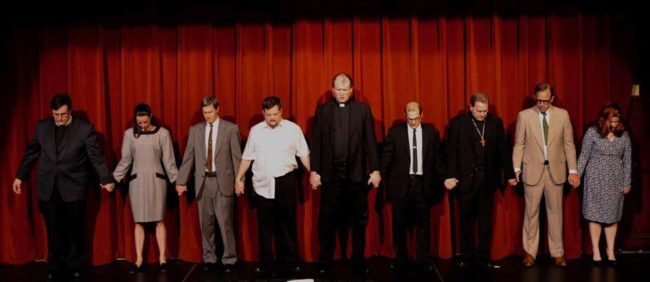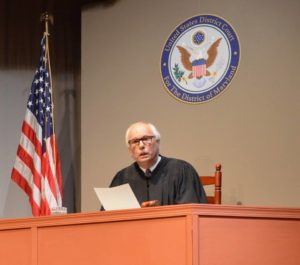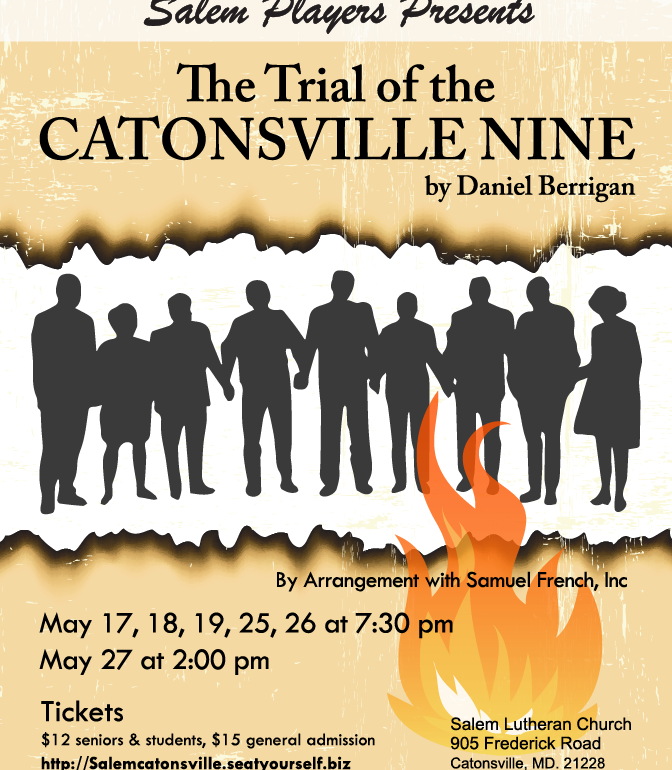You cannot know where you are going until you know where you have been; those who are ignorant of history are bound to repeat it. Never have words felt truer; the times in which we live call for a drastic examination of history to give us hope for moving forward as a society. A true historical event, recognized nationally in 1968 put 21228— the great community of Catonsville— on the map. Daniel Berrigan, a priest turned playwright, recounts the events of “The Action at Catonsville” in his dramatization of their courtroom procession in The Trial of the Catonsville Nine. 50 years to the date, The Salem Players opened this evocative production— a piece of tangible real-life history right in their own backyard, now on their stage for the masses to consume, process, absorb, and understand. Directed by Tim Van Sant, this strikingly relevant and politically poignant piece of theatre is stunning to experience, all the more so because the incident in question happened just down the street in Catonsville.

Vietnam: whatever your standing on that war— pro or con— its mere mention conjures up feelings for just about everyone. This lively piece of theatre exams the actions, rather the trial of the actions, of nine individuals associated with the Catholic faith, who entered a military draft board office on May 17, 1968 in Catonsville, MD and stole hundreds of records from that office. They took the records out to the parking lot, poured homemade napalm over them, and burned them in protest of the Vietnam war. Fr. Daniel Berrigan said of the incident later, (and this line is mentioned in the play as well) “Our apologies, good friends, for the fracture of good order, the burning of paper instead of children.”
The production itself is quite striking to behold. Director Tim Van Sant has selected a fine team of nine individuals to play the parts of the nine figure of history in this show. He’s also pulled forth four other individuals who are notable talent to fill in the roles of Judge, Prosecuting Attorney, D.A., and the witness Mary Murphy. Van Sant fabricates an authentic looking courtroom set, decorated by Shannon Willing, and keeps things otherwise aesthetically simplistic. His intent for the play’s focus is what is being said and what is being heard (or in a great many cases what is not being heard) and this basic approach allows for that readily.
What’s most visually remarkable about the play, in addition to the blocking and movement choreography crafted by Debra Evans DeVoe, is the use of a single spotlight by Lighting Designers Amanda Yerkey and Marleigh Toscano. Every time Fr. Daniel Berrigan addresses the audience with a bit of an aside, he is framed in this spotlight and the rest of the stage is dimmed to darkness. This helps to clearly delineate moments of active action in the courtroom from his internal monologue, as Fr. Daniel Berrigan is an active character in the proceedings in addition to being our narrative Virgil through this stimulating purgatory.
While Lisa Yerkey’s role as the Witness Mary isn’t a long-lived one, her testimony comes from an authentic place, feeling earnest and open when she speaks. There is a conviviality about the way she presents this character, one that could readily be hated by us, the audience, allowing us to empathize with her. As the show begins, we the audience, are subtly indoctrinated as the jury, addressed by the judge in a manner that doesn’t quite break the fourth wall but allows us to feel included. In this way, anyone watching who has a personal connection to the subject matter at hand can feel invested and involved more readily with what’s being trafficked across the stage.
Jane Nitsch takes on the role of the Prosecutor. Arguably her character is not meant to be humorous but the way her patience wains thin and the way she constantly rolls her eyes makes for a few underhanded laughs throughout the performance. The polished closing argument that Nitsch presents as the Prosecuting Attorney is driven, and much like Yerkey’s witness testimony, derives from a place of authentic passion. Playing opposite the Prosecuting Attorney, Carol Evans takes up the role of the Defense Attorney with gusto and vigor. Cheeky and well-tempered, there are lines of Evans’ that land with a smart blow, keeping her confidence in her clients high. Evans is well suited for the role and makes a good match against Nitsch in this show.

Presiding over the courtroom, Tim Evans situates himself well into the role of the Judge. There is a humorous exacerbation present whenever he reminds one of the defendants that “incident-X” or “situation-Y” or “group-Z” is not on trial at present. Evans is steady in his textual delivery, consistent with his lack of empathy and overall emotional investment; this serves the role well, however frustrating it may be for the more passionate characters to keep ramming against the stone pillar of the nation’s justice system in human form.
Each of the nine performers does an extraordinary job of giving their testimony, whether it is in a moment of expressing their backgrounds that led up to their becoming part of “The Action at Catonsville” or expression their feelings and sentiments of faith and their purpose in life to serve their missions of faith, everyone finds a moment of deeply connected, emotional passion to pour out and share with the courtroom and everyone in it. There is a particularly compelling section of testimony given by Fr. Philip Berrigan (Chris Carothers) regarding “not having it both ways.” It is a driven moment delivered with hard truths and a job well done by Carothers.
A truly harrowing bit of testimony is delivered by John Hogan (Michael Fitch) about a comparative scenario involving children and an out-of-control car. Fitch is deeply invested in the emotional outcry of this moment and it is a moving moment that stirs deeply the hearts of those watching. More edgy and bombastic and at times such a loose cannon that he sets the room on edge, George Mische (Damien Gibbons) frequently expresses his views and feelings with great volume and temper. Gibbons, who handles the role expertly, maintains a level of vocal control over these outbursts so that his words can still readily be understood.
One of the subtler individuals in the nine, Thomas Lewis (Ben Barlow), still finds his place during various segments of testimony. The thing that sets Barlow’s performance apart from the others is the cadence with which he delivers it. He speaks like a true man of the 1960’s, grasping the patois and vocal intonation of the times when he delivers his text. David Darst (at this performance Nick Mason) is subtle as well, but makes his point about being a “conscious rejector” of the war quite clearly.
Marjorie Melville (Katelyn Leisner) and Thomas Melville (Orbie Shively) have blazing bouts of passion when they testify together about the happenings in Guatemala. Both Shively and Leisner are strikingly present and make their pleas, as well as the connections from that experience to the Catonsville Action, quite clearly, even if they appear to fall on the metaphorically deaf ears of the judge. Emily Lambert, who plays Mary Moylan, is of a similar convicted passion. When the nine come together in prayer, both at the beginning of the show and at its conclusion, the way they speak and hold hands, truly reads as if they are of one united belief and faith, truly making a stand for righteousness and justice.
John Dignam does not carry the show as it truly is a team effort, but rather guides the experience forward in his role as Fr. Daniel Berrigan. There is something astonishing about his sense of stage presence and the way with which Dignam connects to the character. When he reads out what the good Father has written regarding the action, it is harrowing and humbling, coming from a deep well of expressive sincerity. Dignam is an extraordinary choice for the part, and carries the badge of leadership, narrative guidance, and overall connection portal from stage to audience with great dignity and reverence.
Witness history; do not remain ignorant of the past, willfully or otherwise. The Salem Players are presenting a superb opportunity to be ensconced in a living moment of history, and this is one for the books, as the production not only coincides with the 50th anniversary of the action to the day, it also arrives at a time when a commemorative statue-plaque has just been unveiled in the community to commemorate these individuals.
Running Time: Approximately 95 minutes with no intermission
The Trial of the Catonsville Nine plays through May 27, 2018 at The Salem Players— Salem Evangelical Lutheran Church at 905 Frederick Road in Catonsville, MD. For tickets call (410) 747-0720 or purchase them online.
Our apologies, good friends, for the fracture of good order, the burning of paper instead of children…

